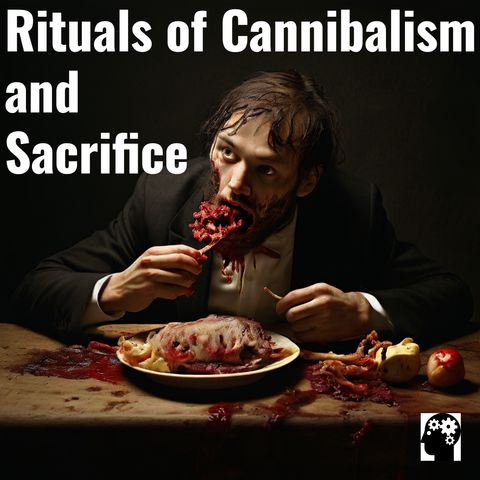
Contacts
Info
Cannibalism and Human Sacrifice: A Dark Chapter in Human History Cannibalism and human sacrifice are practices that have appeared in various cultures throughout history, often provoking a mix of horror...
show moreCannibalism and human sacrifice are practices that have appeared in various cultures throughout history, often provoking a mix of horror and fascination.
Cannibalism, the act of consuming human flesh, and human sacrifice, the offering of human lives to deities or for other ritualistic purposes, are both deeply intertwined with the cultural, religious, and social dynamics of the societies that practiced them.
In many ancient societies, cannibalism was a ritualistic act imbued with spiritual significance. It was believed to transfer the power or qualities of the consumed person to the consumer.
For instance, among certain indigenous tribes in Papua New Guinea, consuming the flesh of an enemy was thought to transfer their strength and bravery to the victor.
Similarly, some cultures practiced endocannibalism, where members of a tribe would consume the flesh of their deceased relatives as an act of reverence and to keep their spirits alive within the community.
Human sacrifice, on the other hand, was often performed to appease gods, seek favor, or as part of significant ceremonies. The Aztecs, for example, conducted large-scale human sacrifices to ensure the sun would rise and their crops would grow.
These rituals were highly organized and involved specific ceremonial protocols. In ancient Mesopotamia, human sacrifices were sometimes conducted to accompany a deceased ruler into the afterlife, reflecting the belief in the continued service of subjects even in death.
While these practices are largely extinct today, their historical presence raises important questions about the nature of humanity, the intersection of belief and violence, and the ways in which societies organize themselves around concepts of life, death, and power.
Understanding the contexts in which cannibalism and human sacrifice occurred allows us to gain deeper insights into the complexities of human culture and the evolution of societal norms.
We hope this topic has been useful to you. Share it if you think it can help other people. Be happy.
We trust this information has provided clarity. Feel free to share it if you believe others might benefit. Stay joyful.
We aim to make this topic insightful for you. If you found it helpful, please share it with others. Stay positive.
Delve deeper into the fascinating and often chilling history of human rituals with our handpicked selection of books on Amazon.
Click here to explore and expand your knowledge!

Cannibalism and Human Sacrifice: A Dark Chapter in Human History Cannibalism and human sacrifice are practices that have appeared in various cultures throughout history, often provoking a mix of horror...
show moreCannibalism and human sacrifice are practices that have appeared in various cultures throughout history, often provoking a mix of horror and fascination.
Cannibalism, the act of consuming human flesh, and human sacrifice, the offering of human lives to deities or for other ritualistic purposes, are both deeply intertwined with the cultural, religious, and social dynamics of the societies that practiced them.
In many ancient societies, cannibalism was a ritualistic act imbued with spiritual significance. It was believed to transfer the power or qualities of the consumed person to the consumer.
For instance, among certain indigenous tribes in Papua New Guinea, consuming the flesh of an enemy was thought to transfer their strength and bravery to the victor.
Similarly, some cultures practiced endocannibalism, where members of a tribe would consume the flesh of their deceased relatives as an act of reverence and to keep their spirits alive within the community.
Human sacrifice, on the other hand, was often performed to appease gods, seek favor, or as part of significant ceremonies. The Aztecs, for example, conducted large-scale human sacrifices to ensure the sun would rise and their crops would grow.
These rituals were highly organized and involved specific ceremonial protocols. In ancient Mesopotamia, human sacrifices were sometimes conducted to accompany a deceased ruler into the afterlife, reflecting the belief in the continued service of subjects even in death.
While these practices are largely extinct today, their historical presence raises important questions about the nature of humanity, the intersection of belief and violence, and the ways in which societies organize themselves around concepts of life, death, and power.
Understanding the contexts in which cannibalism and human sacrifice occurred allows us to gain deeper insights into the complexities of human culture and the evolution of societal norms.
We hope this topic has been useful to you. Share it if you think it can help other people. Be happy.
We trust this information has provided clarity. Feel free to share it if you believe others might benefit. Stay joyful.
We aim to make this topic insightful for you. If you found it helpful, please share it with others. Stay positive.
Delve deeper into the fascinating and often chilling history of human rituals with our handpicked selection of books on Amazon.
Click here to explore and expand your knowledge!
Information
| Author | Find Out How! |
| Organization | Find Out How! |
| Categories | Society & Culture , History , Religion & Spirituality |
| Website | - |
| apacktosend@hotmail.com |
Copyright 2024 - Spreaker Inc. an iHeartMedia Company
